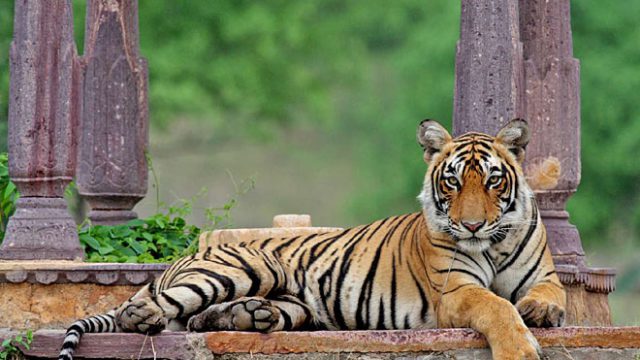I was only 16 when I had my first brush with a National Park. While on a family trip to Jaipur, my family realised that the Pink City wasn’t working its charm on their teenage son and thus, a tiger reserve was added to the itinerary. That was Ranthambore National Park, which kick-started my love for India’s jungles.
That first trip offered little in terms of sightings, however, the experience had left me smitten. In less than two years, I was back at Ranthambore. This time around, luck seemed to be firmly on my side, as my first safari yielded the captivating sight of a mating pair of tigers. Not a bad way to get off the mark, I had thought to myself.
My hunger for a tiger sighting had been sated, but my luck was riding high, and barely ten minutes into my second safari, I spotted a lone jeep, parked along a bend ahead of us. The occupants were gesturing wildly towards something and I knew such excitement could have only been aroused by a tiger. Standing up on the back of the jeep, I frantically scanned the ground ahead of me for a glimpse of the beast, but to no avail. An entire minute passed before I realised that the tiger wasn’t in plain view, instead, it was partially concealed behind a profusion of arid bushes which swept the slope of a hill. A closer inspection, with the help of binoculars, revealed startling details I had missed earlier—the tiger was missing all its canines and that it was feasting on a domesticated buffalo carcass in the middle of a national park! I turned to my guide for answers. Turns out that this was no ordinary tiger I had sighted, this was none other than the legendary tigress T16, better known as Machli!
Machli, or ‘fish’ in Hindi, is a rather peculiar name for a tiger. The name comes from a fish-like marking on the left side of her face. However, this was a fish with a mammoth legacy. She’d lost three of her canines in a face-off with a 14-foot-long crocodile, a gory clash that had been recorded by an amateur photographer. Apart from this, she also holds the distinction of being the oldest living tiger in the wild, in the whole world. She is also the most documented, making her a celebrity amongst wildlife enthusiasts the world over. Her international celebrity status has boosted the tourism economy at Ranthambore by a reported 100 million dollars! However, her contributions to the park don’t end there; she’s been a proud mother of eleven cubs, and a fiercely protective mother too, as stories of her battles with bigger, stronger males are a staple at campfires.
The stoic forest guards of Ranthambore haven’t been able to resist her charm either. In order to prolong her lifespan, they occasionally resort to a highly questionable practice of feeding her livestock (this explains the buffalo kill I had spotted), even though she is still capable of bagging her own prey. My guide had also shared a story about a fascinating relationship between Machli and a particular forest guard. In the sweltering summer heat, the guard would help quench Machli’s thirst by venturing into the forest to open a tap that supplied water to a particular watering-hole that she frequented. Apparently, Machli had become so accustomed to his presence that she didn’t mind his company while she drank from the watering-hole. The story may well be apocryphal, but it made me realise the depth of affection the forest guards possessed for this wild tigress.
Three years had passed since I first saw Machli, and when I visited Ranthambore for the third time, I was itching to see her. That season, Machli was in the news due to her absence, for she had gone missing. Perhaps age had finally taken its toll on the valiant old warrior, I thought. But a couple of days before my visit, Machli made headlines once again, this time because she had returned and had been spotted in one for the tourist zones. I was ecstatic when I locked eyes with her, in the same zone, four days later. She seemed in great shape, and was a picture of calm. She certainly didn’t look like she was on her last legs. Well, as it turns out, our fears were completely unfounded. As I write this, Machli has turned 20 (June 2, 2016). Due to her age, these days she has to cope with a blind eye (due to cataract), alongside her lost canines and deteriorating physical condition. It’s been a month since she last held tourists of the park in thrall and I only hope that she’s still around somewhere in Ranthambore, soldiering on in search of her next kill. Long live the queen!




